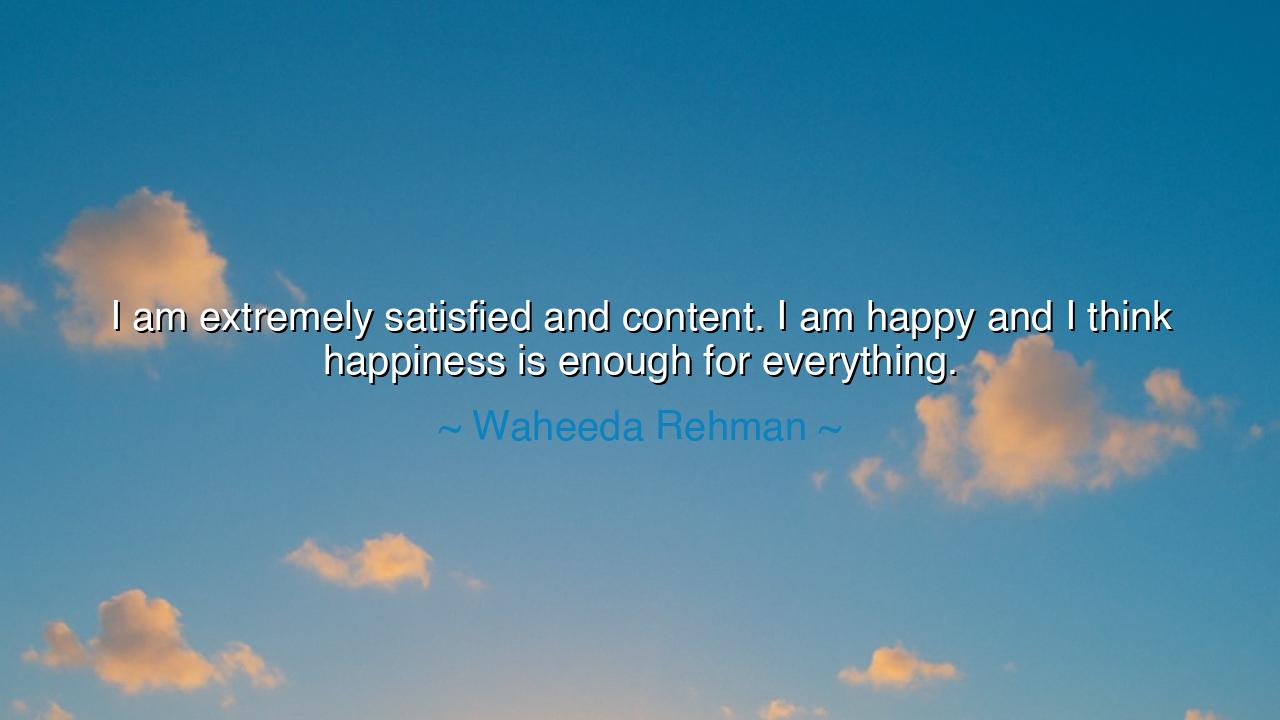
I am extremely satisfied and content. I am happy and I think
I am extremely satisfied and content. I am happy and I think happiness is enough for everything.






The words of Waheeda Rehman, “I am extremely satisfied and content. I am happy and I think happiness is enough for everything,” flow like a quiet river after a long journey—serene, unhurried, and filled with the wisdom of one who has known both the storms and the stillness of life. In this simple yet profound declaration lies an ancient truth: that happiness, when born from contentment, is the final treasure sought by the human heart. All pursuits—of wealth, of beauty, of fame, of power—are but shadows cast by that single light. The soul, when it reaches peace within itself, asks for nothing more.
Waheeda Rehman, one of India’s most beloved and graceful actresses, spoke these words not at the height of ambition, but in reflection—after years of living, learning, and letting go. She had tasted the sweetness of success, the admiration of millions, and yet, like the sages of old, she came to see that true satisfaction does not dwell in applause or achievement. It lies in the quiet joy of being content, in the heart’s acceptance of life as it is. Her statement is not one of complacency, but of clarity. She speaks as one who has crossed the desert of desire and found an oasis not outside, but within her own soul.
This truth, though uttered by a woman of the modern world, echoes through the ages. The ancients knew that contentment is the crown of all virtues. The Stoics of Greece and Rome, like Seneca and Marcus Aurelius, taught that happiness is not found in the possession of external things, but in the mastery of the self. The sages of the East, too, proclaimed that the man or woman who is content is richer than kings. “He who knows that enough is enough,” said Lao Tzu, “will always have enough.” To live with peace in the heart is to be free from the restless hunger that torments the mind. Waheeda Rehman’s words carry this same timeless fragrance—the serenity of one who has learned that nothing external can add to the completeness of a peaceful heart.
Consider the story of Diogenes, the ancient philosopher who lived in a clay jar and owned almost nothing. When Alexander the Great, ruler of the known world, came to visit him and asked if he could grant him any wish, Diogenes merely said, “Yes, stand out of my sunlight.” Alexander, astonished, turned to his men and said, “If I were not Alexander, I would wish to be Diogenes.” For the conqueror had everything yet lacked peace, while the pauper had nothing yet possessed all. This story mirrors the essence of Rehman’s insight: happiness is enough for everything, for it transforms poverty into abundance and loneliness into grace.
Happiness, in its truest form, is not a fleeting emotion born of pleasure, but a state of harmony between the heart and the world. It is the quiet agreement of the soul that life, with all its imperfections, is still good. Rehman’s use of the words “satisfied” and “content” shows a depth of understanding often lost in the noise of modern life. Satisfaction is the fruit of gratitude; it is the ability to see beauty in simplicity, to cherish what one has rather than mourn what one lacks. When she says “happiness is enough,” she does not mean that it negates pain or struggle—but that it redeems them. For when the heart is at peace, even sorrow becomes meaningful, and every trial becomes a teacher.
There is also a lesson here about the illusion of endless wanting. The world teaches us to chase after more—to seek a higher station, a greater recognition, another possession, another victory. But those who chase the horizon find that it always recedes. The wise, like Rehman, discover that the horizon is not beyond them—it is within them. The mind that ceases to crave begins to see, and in that seeing comes joy. The one who can wake with gratitude, eat with peace, work with love, and sleep with no resentment has reached the summit that emperors and conquerors never find.
So, my listener, take these words of Waheeda Rehman as a lamp for your journey. Do not look for happiness in distant places or future days; it dwells already in the quiet chamber of your heart. Learn to be satisfied, not because life is perfect, but because it is yours to live, to shape, to cherish. When you find yourself envying another’s fortune or mourning what is lost, remember that happiness is enough for everything—for it gives meaning to gain and solace to loss. Practice gratitude each morning, speak kindness each day, and forgive freely each night; in these small acts, you will find the infinite wealth of contentment.
For in the end, the greatest wisdom is not how to build empires or gather riches, but how to rest the heart in peace. Waheeda Rehman’s words are the song of a soul that has arrived there—a song both humble and profound. And if you would follow her path, remember this: the world may not always give you what you desire, but it can never take from you the joy that is born from within. Seek that joy, guard it, live it—and you too shall find that happiness, once discovered, is truly enough for everything.






AAdministratorAdministrator
Welcome, honored guests. Please leave a comment, we will respond soon